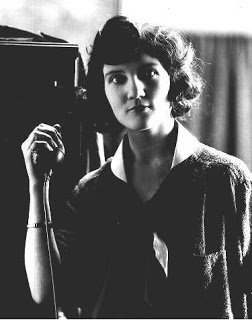A treasure of Salem negatives and photographs has been sorted and catalogued at the Willamette Heritage Center representing the talents of Kathryn Gunnell. Among these pictures are those depicting Salem life in the decade before 1934, Oregon scenery, and even a roll of Technicolor movie film meant to be part of a larger project glorifying the attractions of the state. The collection chronicles several career paths in her two periods of life in Salem.
In the 1920s, her photography studio was Gunnell and Robb located at 520 State Street. There, in the former portraits of those days, she posed infants, sets of twins and families. Off site at local schools, she recorded graduating classes including those at the Chemawa Indian School. As a student of that time remembered her, “Her style was striking. She had flaming red hair which she had done in high style. We kids thought she was wonderful. She had this really smooth way of flattering everyone to get a smile.”
During these years, her camera also focused on such celebrities as “Miss Salem” of 1929 and a thoughtful portrait of Oregon’s 1923-1931 Poet Laureate, Edwin Markham. She gave special attention to performing artists appearing in Salem and was the official photographer for Franchon and Marco, a traveling vaudeville troup. She left portraits of the film actress Elizabeth Waters who appeared in Hollywood’s 1921 “Serenade” and the next year’s “Kindred in the Dust”.
During these years, her camera also focused on such celebrities as “Miss Salem” of 1929 and a thoughtful portrait of Oregon’s 1923-1931 Poet Laureate, Edwin Markham. She gave special attention to performing artists appearing in Salem and was the official photographer for Franchon and Marco, a traveling vaudeville troup. She left portraits of the film actress Elizabeth Waters who appeared in Hollywood’s 1921 “Serenade” and the next year’s “Kindred in the Dust”.
Kathryn was familiar with performers and to their lives. Born in Colorado Springs, Colorado on May 27, 1895, her parents had been a vocal duo in the mining camps of Colorado. When her father died, her mother moved to Oregon, buying a homestead in Scotts Mills where she taught. However, Kathy was not with here in these years. She attended school in Portland where she lived with a relative. She later studied at Willamette University, staying with the Stockton family as a paying guest. Her mother later moved to a home on High Street in Salem, but whether she made a home for Kathy there is unknown.
Sometime in the late 1930s, perhaps because of the Depression, Kathryn moved with her mother to California. There she found a number of different jobs: she worked for Western Union with a sister; with another set up a dress shop; and worked in the film industry, especially with Technicolor, experimenting with lighting.
Twenty or more years passed before Kathryn returned to Salem, starting a new business known as Kathryn Gunnell Enterprises in the 1960s. Her home, orchard, and later her outlet store for locally grown fruits and nuts was on Doakes Ferry Road. The store was originally on the highway, but a new highway by-passed that location. When the business suffered financially, she moved it to her residence where she produced “Golden Nugget” gift packages. Her organizational talents were recognized as a board member of the Willamette Cherry growers, Inc. and in the Oregon Nut Growers.
Her influence grew beyond this commercial venture as she became an Oregon economic development promoter at State Fairs, conventions (such as the Oregon Centennial in 1959) and through promotional agreements with Chambers of Commerce. She sold, or gave away, Oregon product gift packages, some with destinations as far away as Washington, D. C. Her experience with motion pictures in California inspired her to produce several dozen short films, illustrating Oregon’s natural beauty, its agriculture and even its native heritage: one featured students at Chemewa Indian School in their native dress. She even mailed promotional brochures at her own expense. She traveled in a cream-colored 1939 Chevrolet, brightly painted with scenes of Oregon.
As former passengers testified, Kathryn driving “was more a menace than a boon” to the localities where it appeared. They had reason to be wary: in 1953 she had been involved in a two-car accident that cost a woman her life, resulting in a heavy financial settlement against Kathryn. Ironically, in 1972 while walking across a highway, she was herself the victim of an auto accident. This one nearly crippled her and resulted in a Salem hospital stay of eight months. Gunnell Enterprises struggled along, but went out of business about 1977.
Kathryn’s energy and spirit inspired her longtime friend Bea Drury who was remembered her as “a lady to the end.” In a 1987 interview Drury said Gunnell was loath to part with her photographs and films despite losing her equipment and possessions to a bank. Kathryn Gunnell died that year, leaving her legacy of photographs to her friend who gave the collection to a prominent local photographer and historian, Alfred Jones. He donated these historical photographs (and what became ten boxes of personal correspondence) to the organization that is now the Willamette Heritage Center. We await the the day when a permanent exhibit will become a memorial to her photographic talents, her industry, and her promotional efforts on behalf of Salem and the state of Oregon.
As former passengers testified, Kathryn driving “was more a menace than a boon” to the localities where it appeared. They had reason to be wary: in 1953 she had been involved in a two-car accident that cost a woman her life, resulting in a heavy financial settlement against Kathryn. Ironically, in 1972 while walking across a highway, she was herself the victim of an auto accident. This one nearly crippled her and resulted in a Salem hospital stay of eight months. Gunnell Enterprises struggled along, but went out of business about 1977.
Kathryn’s energy and spirit inspired her longtime friend Bea Drury who was remembered her as “a lady to the end.” In a 1987 interview Drury said Gunnell was loath to part with her photographs and films despite losing her equipment and possessions to a bank. Kathryn Gunnell died that year, leaving her legacy of photographs to her friend who gave the collection to a prominent local photographer and historian, Alfred Jones. He donated these historical photographs (and what became ten boxes of personal correspondence) to the organization that is now the Willamette Heritage Center. We await the the day when a permanent exhibit will become a memorial to her photographic talents, her industry, and her promotional efforts on behalf of Salem and the state of Oregon.
This profile is based on a SalemHistory website entry of 2001 compiled by this author. Sam Pearson, an Corban University student and volunteer at Willamette Heritage Center in 2012, also contributed.


2 Comments